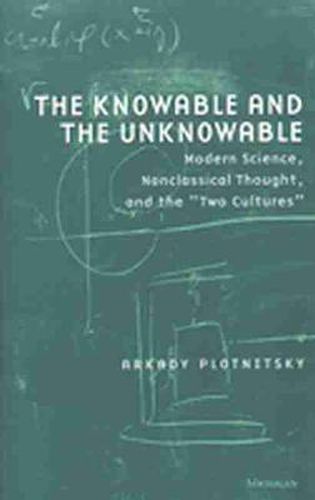Readings Newsletter
Become a Readings Member to make your shopping experience even easier.
Sign in or sign up for free!
You’re not far away from qualifying for FREE standard shipping within Australia
You’ve qualified for FREE standard shipping within Australia
The cart is loading…






This book investigates the relationships between modern mathematics and science (in particular, quantum mechanics) and the mode of theorizing that Arkady Plotnitsky defines as nonclassical and identifies in the work of Bohr, Heisenberg, Lacan, and Derrida. Plotinsky argues that their scientific and philosophical works radically redefined the nature and scope of our knowledge. Building upon their ideas, the book finds a new, nonclassical character in the dream of great interconnections Bohr described, thereby engaging with recent debates about the two cultures (the humanities and the sciences). Plotnitsky highlights those points at which the known gives way to the unknown (and unknowable). These points are significant, he argues, because they push the boundaries of thought and challenge the boundaries of disciplinarity. One of the book’s most interesting observations is that key figures in science, in order to push toward a framing of the unknown, actually retreated into a conservative disciplinarity. Plotnitsky’s informed, interdisciplinary approach is more productive than the disparaging attacks on postmodernism or scientism that have hitherto characterized this discourse. Arkady Plotnitsky is Professor of English and Director, Theory and Cultural Studies Program, Purdue University. Trained in both mathematics and literary theory, he is author of several books, including In the Shadow of Hegel: Complementarity, History and the Unconscious and Reconfigurations: Critical Theory and General Economy.
$9.00 standard shipping within Australia
FREE standard shipping within Australia for orders over $100.00
Express & International shipping calculated at checkout
Stock availability can be subject to change without notice. We recommend calling the shop or contacting our online team to check availability of low stock items. Please see our Shopping Online page for more details.
This book investigates the relationships between modern mathematics and science (in particular, quantum mechanics) and the mode of theorizing that Arkady Plotnitsky defines as nonclassical and identifies in the work of Bohr, Heisenberg, Lacan, and Derrida. Plotinsky argues that their scientific and philosophical works radically redefined the nature and scope of our knowledge. Building upon their ideas, the book finds a new, nonclassical character in the dream of great interconnections Bohr described, thereby engaging with recent debates about the two cultures (the humanities and the sciences). Plotnitsky highlights those points at which the known gives way to the unknown (and unknowable). These points are significant, he argues, because they push the boundaries of thought and challenge the boundaries of disciplinarity. One of the book’s most interesting observations is that key figures in science, in order to push toward a framing of the unknown, actually retreated into a conservative disciplinarity. Plotnitsky’s informed, interdisciplinary approach is more productive than the disparaging attacks on postmodernism or scientism that have hitherto characterized this discourse. Arkady Plotnitsky is Professor of English and Director, Theory and Cultural Studies Program, Purdue University. Trained in both mathematics and literary theory, he is author of several books, including In the Shadow of Hegel: Complementarity, History and the Unconscious and Reconfigurations: Critical Theory and General Economy.